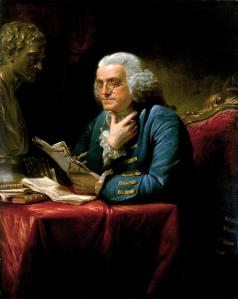 In a day and age when few men are thinking about their own or anyone else’s character development, thoughtful men must look to the past to gain inspiration. Benjamin Franklin, one of the American Revolution’s most notable figures is such an inspiration. He was a Founding Father of the United States, a polymath, author, printer, inventor, postmaster, Rosicrucian and Freemason.
In a day and age when few men are thinking about their own or anyone else’s character development, thoughtful men must look to the past to gain inspiration. Benjamin Franklin, one of the American Revolution’s most notable figures is such an inspiration. He was a Founding Father of the United States, a polymath, author, printer, inventor, postmaster, Rosicrucian and Freemason.
He invented the lightening rod, bifocal lenses, the Franklin stove, the carriage odometer, the glass armonica. He founded the first lending library and the first Fire Department in Pennsylvania.
Franklin sought to cultivate his character by a plan of thirteen virtues, which he developed at age 20 (in 1726) and continued to practice in some form for the rest of his life. His autobiography lists his thirteen virtues as:
- Temperance: “Eat not to dullness; drink not to elevation.”
- Silence: “Speak not but what may benefit others or yourself; avoid trifling conversation.”
- Order: “Let all your things have their places; let each part of your business have its time.”
- Resolution: “Resolve to perform what you ought; perform without fail what you resolve.”
- Frugality: “Make no expense but to do good to others or yourself; i.e., waste nothing.”
- Industry: “Lose no time; be always employ’d in something useful; cut off all unnecessary actions.”
- Sincerity: “Use no hurtful deceit; think innocently and justly, and, if you speak, speak accordingly.”
- Justice: “Wrong none by doing injuries, or omitting the benefits that are your duty.”
- Moderation: “Avoid extremes; forbear resenting injuries so much as you think they deserve.”
- Cleanliness: “Tolerate no uncleanliness in body, cloaths, or habitation.”
- Tranquility: “Be not disturbed at trifles, or at accidents common or unavoidable.”
- Chastity: “Rarely use venery but for health or offspring, never to dullness, weakness, or the injury of your own or another’s peace or reputation.”
- Humility: “Imitate Jesus and Socrates.”
Franklin did not try to work on them all at once. Instead, he would work on one and only one each week “leaving all others to their ordinary chance”. While Franklin did not live completely by his virtues and by his own admission, he fell short of them many times, he believed the attempt made him a better man contributing greatly to his success and happiness, which is why in his autobiography, he devoted more pages to this plan than to any other single point; in his autobiography Franklin wrote, “I hope, therefore, that some of my descendants may follow the example and reap the benefit.”
Men like Benjamin Franklin are not very common these days. But I firmly believe that men today could do much good while striving to follow his example.

